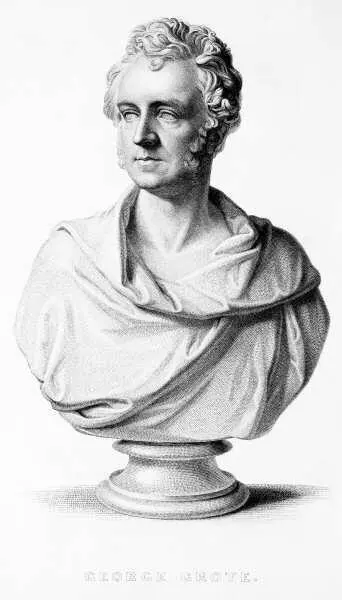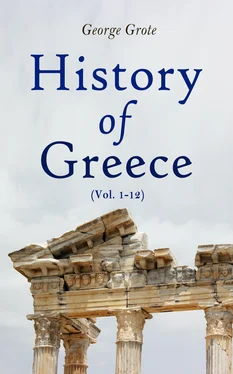George Grote
History of Greece (Vol. 1-12)
Complete Edition
e-artnow, 2022
Contact: info@e-artnow.org
EAN 4066338120465
Volume I Volume I Table of Contents PREFACE. PREFACE TO THE SECOND EDITION OF VOLUMES I. AND II. NAMES OF GODS, GODDESSES, AND HEROES. PART I. LEGENDARY GREECE. CHAPTER I. LEGENDS RESPECTING THE GODS. CHAPTER II. LEGENDS RELATING TO HEROES AND MEN. CHAPTER III. LEGEND OF THE IAPETIDS. CHAPTER IV. HEROIC LEGENDS.—GENEALOGY OF ARGOS. CHAPTER V. DEUKALION, HELLEN, AND SONS OF HELLEN. CHAPTER VI. THE ÆOLIDS, OR SONS AND DAUGHTERS OF ÆOLUS. CHAPTER VII. THE PELOPIDS. CHAPTER VIII. LACONIAN AND MESSENIAN GENEALOGIES. CHAPTER IX. ARCADIAN GENEALOGY. CHAPTER X. ÆAKUS AND HIS DESCENDANTS.—ÆGINA, SALAMIS, AND PHTHIA. CHAPTER XI. ATTIC LEGENDS AND GENEALOGIES. CHAPTER XII. KRETAN LEGENDS.—MINOS AND HIS FAMILY. CHAPTER XIII. ARGONAUTIC EXPEDITION. CHAPTER XIV. LEGENDS OF THEBES. CHAPTER XV. LEGEND OF TROY. CHAPTER XVI. GRECIAN MYTHES, AS UNDERSTOOD, FELT AND INTERPRETED BY THE GREEKS THEMSELVES. CHAPTER XVII. THE GRECIAN MYTHICAL VEIN COMPARED WITH THAT OF MODERN EUROPE.
Volume II Volume II Table of Contents PART I. CONTINUATION OF LEGENDARY GREECE. CHAPTER XVIII. CLOSING EVENTS OF LEGENDARY GREECE.—PERIOD OF INTERMEDIATE DARKNESS, BEFORE THE DAWN OF HISTORICAL GREECE. CHAPTER XIX. APPLICATION OF CHRONOLOGY TO GRECIAN LEGEND. CHAPTER XX. STATE OF SOCIETY AND MANNERS AS EXHIBITED IN GRECIAN LEGEND. CHAPTER XXI. GRECIAN EPIC.—HOMERIC POEMS. PART II. HISTORICAL GREECE. CHAPTER I. GENERAL GEOGRAPHY AND LIMITS OF GREECE. CHAPTER II. THE HELLENIC PEOPLE GENERALLY, IN THE EARLY HISTORICAL TIMES. CHAPTER III. MEMBERS OF THE HELLENIC AGGREGATE, SEPARATELY TAKEN.—GREEKS NORTH OF PELOPONNESUS. CHAPTER IV. EARLIEST HISTORICAL VIEW OF PELOPONNESUS. DORIANS IN ARGOS AND THE NEIGHBORING CITIES. CHAPTER V. ÆTOLO-DORIAN EMIGRATION INTO PELOPONNESUS.—ELIS, LACONIA, AND MESSENIA. CHAPTER VI. LAWS AND DISCIPLINE OF LYKURGUS AT SPARTA. CHAPTER VII. FIRST AND SECOND MESSENIAN WARS. CHAPTER VIII. CONQUESTS OF SPARTA TOWARDS ARCADIA AND ARGOLIS.
Volume III
Volume IV
Volume V
Volume VI
Volume VII
Volume VIII
Volume IX
Volume X
Volume XI
Volume XII
Table of Contents
PREFACE.
PREFACE TO THE SECOND EDITION OF VOLUMES I. AND II.
NAMES OF GODS, GODDESSES, AND HEROES.
PART I. LEGENDARY GREECE.
CHAPTER I. LEGENDS RESPECTING THE GODS.
CHAPTER II. LEGENDS RELATING TO HEROES AND MEN.
CHAPTER III. LEGEND OF THE IAPETIDS.
CHAPTER IV. HEROIC LEGENDS.—GENEALOGY OF ARGOS.
CHAPTER V. DEUKALION, HELLEN, AND SONS OF HELLEN.
CHAPTER VI. THE ÆOLIDS, OR SONS AND DAUGHTERS OF ÆOLUS.
CHAPTER VII. THE PELOPIDS.
CHAPTER VIII. LACONIAN AND MESSENIAN GENEALOGIES.
CHAPTER IX. ARCADIAN GENEALOGY.
CHAPTER X. ÆAKUS AND HIS DESCENDANTS.—ÆGINA, SALAMIS, AND PHTHIA.
CHAPTER XI. ATTIC LEGENDS AND GENEALOGIES.
CHAPTER XII. KRETAN LEGENDS.—MINOS AND HIS FAMILY.
CHAPTER XIII. ARGONAUTIC EXPEDITION.
CHAPTER XIV. LEGENDS OF THEBES.
CHAPTER XV. LEGEND OF TROY.
CHAPTER XVI. GRECIAN MYTHES, AS UNDERSTOOD, FELT AND INTERPRETED BY THE GREEKS THEMSELVES.
CHAPTER XVII. THE GRECIAN MYTHICAL VEIN COMPARED WITH THAT OF MODERN EUROPE.
 GEORGE GROTE.
GEORGE GROTE.
Table of Contents
The first idea of this History was conceived many years ago, at a time when ancient Hellas was known to the English public chiefly through the pages of Mitford; and my purpose in writing it was to rectify the erroneous statements as to matter of fact which that History contained, as well as to present the general phenomena of the Grecian world under what I thought a juster and more comprehensive point of view. My leisure, however, was not at that time equal to the execution of any large literary undertaking; nor is it until within the last three or four years that I have been able to devote to the work that continuous and exclusive labor, without which, though much may be done to illustrate detached points, no entire or complicated subject can ever be set forth in a manner worthy to meet the public eye.
Meanwhile the state of the English literary world, in reference to ancient Hellas, has been materially changed in more ways than one. If my early friend Dr. Thirlwall’s History of Greece had appeared a few years sooner, I should probably never have conceived the design of the present work at all; I should certainly not have been prompted to the task by any deficiencies, such as those which I felt and regretted in Mitford. The comparison of the two authors affords, indeed, a striking proof of the progress of sound and enlarged views respecting the ancient world during the present generation. Having studied of course the same evidences as Dr. Thirwall, I am better enabled than others to bear testimony to the learning, the sagacity, and the candor which pervade his excellent work: and it is the more incumbent on me to give expression to this sentiment, since the particular points on which I shall have occasion to advert to it will, unavoidably, be points of dissent oftener than of coincidence.
The liberal spirit of criticism, in which Dr. Thirwall stands so much distinguished from Mitford, is his own: there are other features of superiority which belong to him conjointly with his age. For during the generation since Mitford’s work, philological studies have been prosecuted in Germany with remarkable success: the stock of facts and documents, comparatively scanty, handed down from the ancient world, has been combined and illustrated in a thousand different ways: and if our witnesses cannot be multiplied, we at least have numerous interpreters to catch, repeat, amplify, and explain their broken and half-inaudible depositions. Some of the best writers in this department—Boeckh, Niebuhr, O. Müller—have been translated into our language; so that the English public has been enabled to form some idea of the new lights thrown upon many subjects of antiquity by the inestimable aid of German erudition. The poets, historians, orators, and philosophers of Greece, have thus been all rendered both more intelligible and more instructive than they were to a student in the last century; and the general picture of the Grecian world may now be conceived with a degree of fidelity, which, considering our imperfect materials, it is curious to contemplate.
It is that general picture which an historian of Greece is required first to embody in his own mind, and next to lay out before his readers;—a picture not merely such as to delight the imagination by brilliancy of coloring and depth of sentiment, but also suggestive and improving to the reason. Not omitting the points of resemblance as well as of contrast with the better-known forms of modern society, he will especially study to exhibit the spontaneous movement of Grecian intellect, sometimes aided but never borrowed from without, and lighting up a small portion of a world otherwise clouded and stationary. He will develop the action of that social system, which, while insuring to the mass of freemen a degree of protection elsewhere unknown, acted as a stimulus to the creative impulses of genius, and left the superior minds sufficiently unshackled to soar above religious and political routine, to overshoot their own age, and to become the teachers of posterity.
Читать дальше

 GEORGE GROTE.
GEORGE GROTE.










